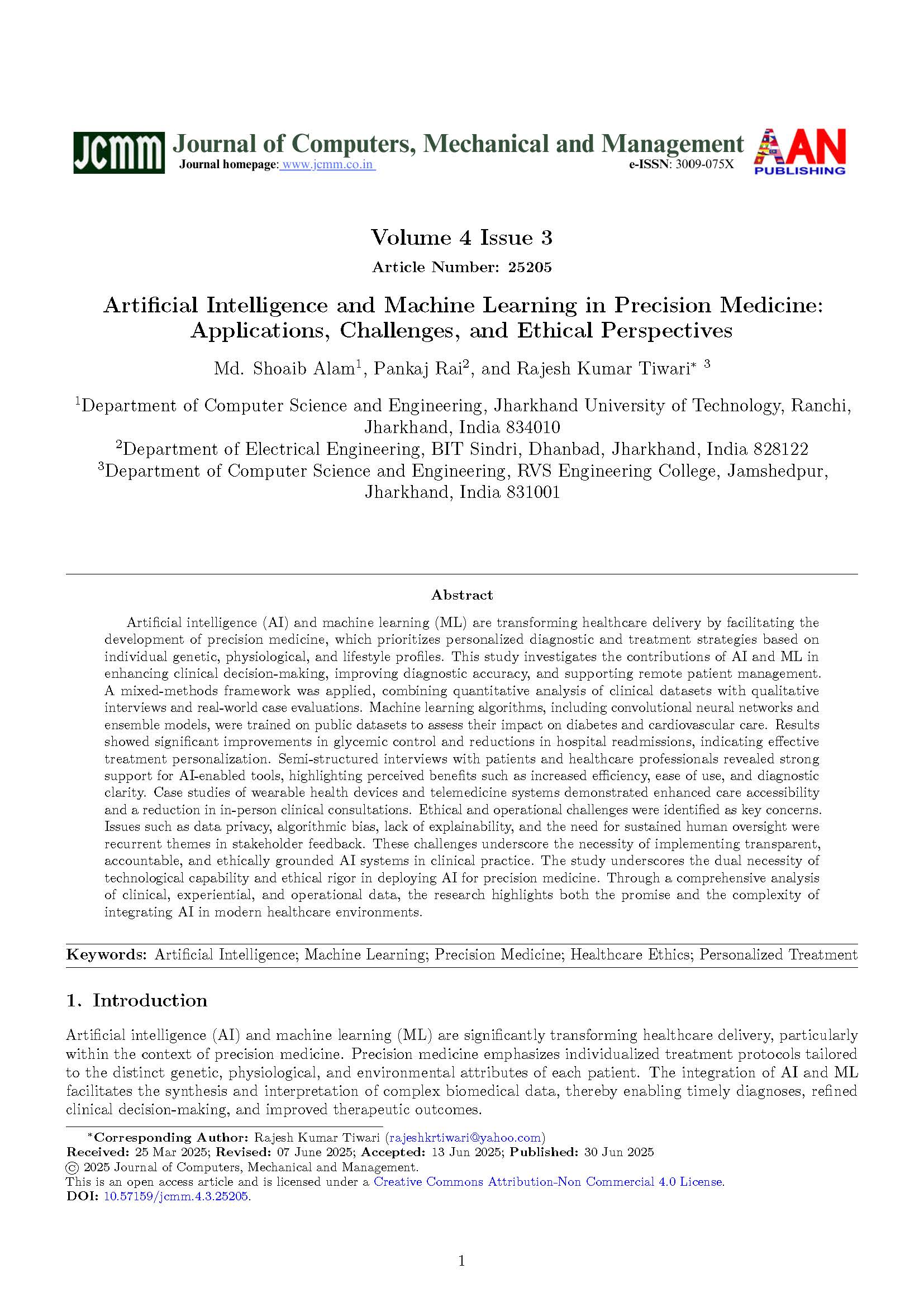Artificial Intelligence and Machine Learning in Precision Medicine
Applications, Challenges, and Ethical Perspectives
DOI:
https://doi.org/10.57159/jcmm.4.3.25205Keywords:
Artificial Intelligence, Machine Learning, Precision Medicine, Healthcare Ethics, Personalized TreatmentAbstract
Artificial intelligence (AI) and machine learning (ML) are transforming healthcare delivery by facilitating the development of precision medicine, which prioritizes personalized diagnostic and treatment strategies based on individual genetic, physiological, and lifestyle profiles. This study investigates the contributions of AI and ML in enhancing clinical decision-making, improving diagnostic accuracy, and supporting remote patient management. A mixed-methods framework was applied, combining quantitative analysis of clinical datasets with qualitative interviews and real-world case evaluations. Machine learning algorithms, including convolutional neural networks and ensemble models, were trained on public datasets to assess their impact on diabetes and cardiovascular care. Results showed significant improvements in glycemic control and reductions in hospital readmissions, indicating effective treatment personalization. Semi-structured interviews with patients and healthcare professionals revealed strong support for AI-enabled tools, highlighting perceived benefits such as increased efficiency, ease of use, and diagnostic clarity. Case studies of wearable health devices and telemedicine systems demonstrated enhanced care accessibility and a reduction in in-person clinical consultations. Ethical and operational challenges were identified as key concerns. Issues such as data privacy, algorithmic bias, lack of explainability, and the need for sustained human oversight were recurrent themes in stakeholder feedback. These challenges underscore the necessity of implementing transparent, accountable, and ethically grounded AI systems in clinical practice. The study underscores the dual necessity of technological capability and ethical rigor in deploying AI for precision medicine. Through a comprehensive analysis of clinical, experiential, and operational data, the research highlights both the promise and the complexity of integrating AI in modern healthcare environments.
References
A. Arora, “Conceptualising artificial intelligence as a digital healthcare innovation: An introductory review,” Medical Devices: Evidence and Research, vol. 13, pp. 223–230, 2020.
T. L. Pop, “Introducere în utilizarea inteligenței artificiale în pediatrie,” Pediatria, vol. 70, no. 2, pp. 153–158, 2023.
M. Aluas and S. Bolboacă, “Is the biggest problem of health-related artificial intelligence an ethical one?,” Bioethica, vol. 25, no. 2, pp. 98–105, 2019.
T. Hendl, “Fairness, risk, and responsibility in the use of predictive algorithms in health care,” The American Journal of Bioethics, vol. 20, no. 11, pp. 18–20, 2020.
J. Herington, M. McCradden, K. Creel, R. Boellaard, E. C. Jones, A. K. Jha, A. Rahmim, P. J. H. Scott, J. J. Sunderland, R. Wahl, S. Zuehlsdorff, and B. Saboury, “Ethical considerations for artificial intelligence in medical imaging: Data collection, development, and evaluation,” Journal of Nuclear Medicine, vol. 64, no. 12, pp. 1848–1855, 2023.
S. Tanabe, E. Perkins, R. Ono, and H. Sasaki, “Artificial intelligence in gastrointestinal diseases,” Artificial Intelligence and Gastroenterology, vol. 2, no. 3, pp. 95–102, 2021.
Y. Abdullah, J. Schuman, R. Shabsigh, A. Caplan, and L. Al-Aswad, “Ethics of artificial intelligence in medicine and ophthalmology,” Asia-Pacific Journal of Ophthalmology, vol. 10, no. 3, pp. 195–200, 2021.
E. Y. Timofeeva, S. R. Azilgareeva, A. Morozov, M. Taratkin, and D. V. Enikeev, “Use of artificial intelligence in the diagnosis, treatment, and surveillance of patients with kidney cancer,” Urology Vestnik, vol. 11, no. 3, pp. 142–148, 2023.
Y. Yang, Y. Zhang, and Y. Li, “Artificial intelligence applications in pediatric oncology diagnosis,” Exploration of Targeted Anti-Tumor Therapy, vol. 5, no. 2, pp. 227–239, 2023.
M. Wojtara, E. Rana, T. Rahman, P. Khanna, and H. Singh, “Artificial intelligence in rare disease diagnosis and treatment,” Clinical and Translational Science, vol. 16, no. 8, pp. 1440–1450, 2023.
L. M. Cahyo and S. D. Astuti, “Early detection of health problems through artificial intelligence (AI) technology in hospital information management: A literature review study,” Journal of Medical and Health Sciences, vol. 4, no. 3, pp. 65–75, 2023.
P. Ray, “Generative artificial intelligence (AI) and medical ethics: A symbiotic dance for the future,” Journal of Oral and Maxillofacial Surgery, vol. 81, no. 12, pp. 1238–1241, 2023.
D. Jha, A. Rauniyar, A. Srivastava, D. Hagos, N. K. Tomar, V. Sharma, E. Keles, Z. Zhang, U. Demir, A. Topçu, A. Yazidi, J. Håkegård, and U. Bagci, “Ensuring trustworthy medical artificial intelligence through ethical and philosophical principles,” arXiv preprint, arXiv:2303.00000, 2023.
F. B. Emdad, S. Ho, B. Ravuri, and S. Hussain, “Towards a unified utilitarian ethics framework for healthcare artificial intelligence,” arXiv preprint, arXiv:2304.00000, 2023.
J. Francis, J. V. Varghese, and A. Thomas, “Impact of artificial intelligence on healthcare,” International Journal of Advances in Medicine, vol. 10, no. 9, pp. 2839–2845, 2023.
V. R. Umapathy, S. Rajinikanth, R. Densingh, S. Raj, S. Yadav, S. Athiya, P. A. Munavarah, and K. Padmavathy, “Perspective of artificial intelligence in disease diagnosis: A review of current and future endeavors in the medical field,” Cureus, vol. 15, no. 9, p. e45684, 2023.
A. Mittal, A. Afsar, A. Tayal, and M. Shetty, “Artificial intelligence and healthcare,” MAMC Journal of Medical Sciences, vol. 8, no. 3, pp. 142–148, 2023.
B. Pendy, “Artificial intelligence in health sector of USA,” Journal of Innovation and Scientific Studies, vol. 4, no. 3, pp. 45–56, 2023.

Downloads
Published
How to Cite
Issue
Section
Categories
License
Copyright (c) 2025 Journal of Computers, Mechanical and Management

This work is licensed under a Creative Commons Attribution-NonCommercial 4.0 International License.
The Journal of Computers, Mechanical and Management applies the CC Attribution- Non-Commercial 4.0 International License to its published articles. While retaining copyright ownership of the content, the journal permits activities such as downloading, reusing, reprinting, modifying, distributing, and copying of the articles, as long as the original authors and source are appropriately cited. Proper attribution is ensured by citing the original publication.





